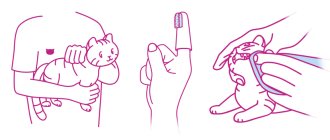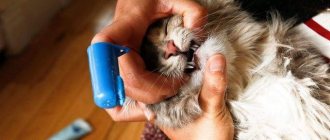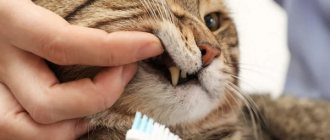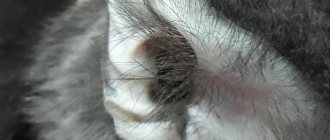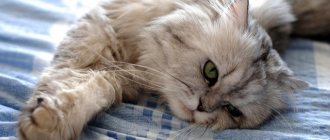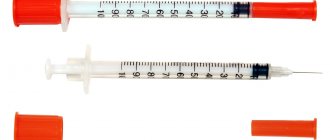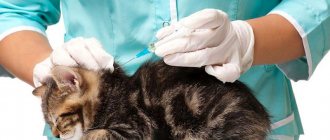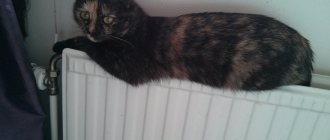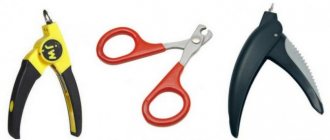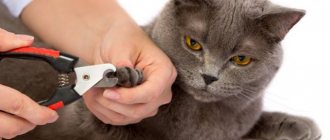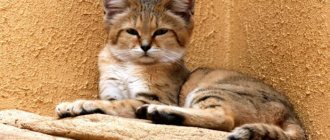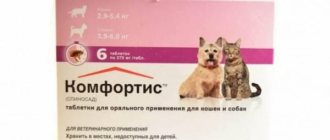What will you learn from the article?
- Does a cat need to brush its teeth?
- Why brush your cat's teeth?
- How to brush your cat's teeth How often should you brush?
- What you need for cleaning
- How to properly brush your cat's teeth at home
- At what age should cats be taught to brush their teeth?
- Alternative cleaning method
- Best Cleaning Products
Brushing your cat's teeth is the most effective way to reduce plaque, prevent tartar, and maintain long-term oral health. This procedure prevents many dental diseases and keeps the cat's breath fresh.
How to teach a kitten to brush its teeth? How correctly and how often should this be done? What means and tools should I use? You will find answers to all these questions in our article.
Do cats need to brush their teeth?
Brushing a cat's teeth is useful and necessary.
This helps keep your pet healthy and prevent gastrointestinal diseases. Teeth cleaning is especially necessary for purebred cats, which are more susceptible to diseases due to low immunity. The diet of domestic animals differs from the diet of wild animals. There they eat raw meat with bones, skin, and tendons. Cleaning the surface of the teeth occurs automatically. Homemade food includes liquids, soft food, and ready-made jelly food. Then cleansing the enamel due to the mechanical action of food is excluded.
A homemade diet leads to plaque formation. Gradually it hardens and transforms into stones. Without cleaning, a favorable environment for the proliferation of pathogenic bacteria is created in the mouth. This provokes the development of stomatitis and gingivitis. Plaque and stones lead to periodontal disease, severe bleeding gums, and caries, which causes tooth loss.
If the inflammatory process becomes constant, it causes diseases of the internal organs.
When pulpitis develops (inflammation in the area of the neurovascular bundle of the tooth), the pet cannot chew, loses appetite, becomes apathetic, and rapidly loses weight.
Cats' teeth are brushed regularly when there are no dental problems. About once a week.
Dental problems in pets appear after 5 years, and initial signs begin at 2 years. The first symptom is bad breath.
There are several cat breeds that have a genetic predisposition to dental disease. Accordingly, representatives of this breed need to be given more attention.
List of breeds that need oral hygiene more often than others:
- Maine Coon;
- Persian;
- Russian Blue;
- British;
- Scottish lop-eared.
When to contact a veterinarian
Regularly, once a month, the cat’s oral cavity must be examined in order to notice the problem in time. The normal dentition of a cat is as follows: the teeth are white or cream-colored, the gums are pink, without bloody cracks or red areas, there are no black spots or pebbles on the teeth, when you lightly press the jaw you should understand that the cat is not in pain. And, of course, no bleeding gums. Also an indicator of problems with teeth or stomach is bad breath.
Adult cats have 30 permanent teeth (16 on the upper jaw, 14 on the lower jaw): 12 incisors, 4 canines, 16 premolars and 4 molars
Watch your eating habits. Sometimes cats with toothache begin to refuse solid food or stop eating altogether. If a cat has similar symptoms, he experiences discomfort and pain. You can’t handle the problem yourself—you’ll need the help of a professional. Regular veterinarians examine and treat the oral cavity of cats; this does not require special specialization. After making a diagnosis, the doctor reports that the tooth or gum can either be treated conservatively, that is, with the help of cleanings and medications, or the tooth will have to be removed. Interesting but disturbing illustrations can be seen by clicking on the photo. photo2
A dentist can pull out a tooth, clean plaque and tartar, and treat it with medications.
Cleaning your cat's teeth at home
At home, animals have their teeth brushed when there are no dental problems, but not often. If there is more than one pet in the house, then each should have an individual brush. Only products intended for animals are selected for processing. It is necessary to take into account the nature of the pet - an aggressive one must first be swaddled.
Cats need to brush their teeth with special brushes and pastes. Brushes can be replaced by wrapping gauze around your finger. But this method is only suitable for calm animals. You can use Show Tech Dental Wipes (a set of 100 pieces costs 455 rubles) or Japan Premium Pet (from 440 rubles/100 pieces).
How often should you clean
Typically, cat teeth do not require daily cleaning. What to give your cat for teeth cleaning so that it happens naturally - solid food, special bones. The best dry granulated food with vitamin supplements are Brit (from 350 rubles) and Royal Canin (from 1300 rubles).
Then, as a preventive measure, it is enough to clean your pet’s mouth 1-2 times a week. But if there are dental problems and the animal tolerates the procedure calmly, then it can be done daily. To prevent diseases, it is necessary to visit a veterinarian annually, contact him at the first signs of pathologies.
Kittens up to 3-5 months of age do not need special oral hygiene until their baby teeth are replaced.
How to choose a toothbrush for a cat
Finger brushes are more suitable for cats - bristled brushes clean teeth, massage brushes brush gums. They are put on the finger. The treatment must be done carefully - the brush will not protect against the bite of a frightened animal.
There are different types of toothbrushes for cats:
- Cliny (from 300 rub.). This is a double-sided finger brush with soft bristles. At the same time massages the gums.
- Xiaomi CatureRollon Oral Care Kit (from RUB 2,300). For cats from 4 months. Removes plaque and prevents the appearance of stones.
- Beaphar (RUB 370) is double-sided, with bristles of different lengths. Suitable for any cat breed. The shape of the brush is specially designed for pets' teeth.
- Show Tech Trio-Pet Toothbrush (450 RUR) is a universal three-sided brush with bristles of different sizes. Cleans teeth from all sides.
- Total Oral Care Dental Kit For Dogs & Cats (RUB 1,200). This is a set of paste and two brushes. One is double-sided, on a handle, the other is finger-type.
Or use a regular toothbrush made for cats. She has a soft, short handle.
Top 5 toothpastes for cats
Pastes for cat teeth are preventative. The main components of the composition are glycerin, carrageenan, triophosphate, and bone meal softens the procedure. They are used constantly; such pastes include chicken, fish, rabbit, and beef flavorings. The most popular brands are Beaphar, Cliny, Trixie.
Companies that produce hygienic toothpastes for cleaning cats' teeth:
- Lovepets, Levrana (350 rub.). Contains natural plant extracts and does not need to be rinsed off. Has bactericidal, antimicrobial, antioxidant effects.
- Cliny (from RUB 315). Contains silver ions. The paste strengthens enamel, relieves inflammation, whitens, and reduces bleeding gums.
- Toothpaste, Globalvet with chicken flavor (390 RUR). Prevents plaque, stone formation, protects against caries.
- Trixie with beef flavor (500 rub.). Prevents the appearance of plaque and stone, and removes existing deposits. Comes complete with brushes of different sizes (for front and back teeth), with attachments for sensitive gums and massage.
- Toothpaste, Beaphar with aroma and taste of liver (400 rub.). Protects against caries, plaque, and stone formation.
Medicinal pastes are used only as prescribed by a veterinarian. It also determines the duration of their use.
Top 4 dental gels for cats
Gels for cleaning teeth are convenient to use when it is not possible or impossible to do this with a paste and brush. Apply 2-3 drops of the product to the teeth. Then the pet will lick its lips, and the composition will mix with saliva and soften the plaque.
List of dental gels that are used for cats:
- Orozyme (from 700 rub.). The gel contains components that gently polish teeth.
- Bionics (120 rub.). Gel for the prevention of oral diseases, plaque, tartar formation, strengthening gums. Antibacterial, immunostimulating agent, has a wound healing effect.
- Cliny (from 250 rub.). The gel softens plaque and frees teeth from it. Eliminates unpleasant odor and is easy to apply. Whitens teeth, freshens breath, prevents and relieves gum inflammation.
- Tropiclean gel removes stink from the mouth, removes plaque and stones, destroys germs, reduces inflammation (cost - from 900 rubles).
To enhance the effectiveness of the gel, after applying it, massage your teeth with your finger or soft cloth. The animal must not be fed or given water 30 minutes before and after the procedure.
How to prepare your cat for teeth brushing
To prepare an adult cat for oral cleaning, you must first let him sniff and lick the objects that you plan to use. The treatment is carried out immediately after eating, when the pet is not yet going to sleep.
Cat teeth cleaning procedure
How to brush a cat's teeth at home - it is better to carry out the activity together - one holds it, the other does the processing. But if it is performed alone, then it is better to wrap the animal in a towel.
Here's how to brush your cat's teeth at home:
- swaddle the paws, hold the cat's head tightly, holding the animal with its legs, with its tail towards you;
- squeeze a drop of paste onto the brush;
- hold your palm on your head, pressing it over your ears;
- Pull the corners of the mouth with your thumb and middle finger;
- With your index finger, first lift the upper lip, exposing the teeth, and after processing them, lift the lower lip;
- teeth are brushed with smooth movements up and down, then from left to right;
- during the event, the brush is kept close to the gums in order to thoroughly clean hard-to-reach areas;
- after the outside, clean the inside;
- hold the brush at an angle of 45°.
How to brush your cat’s teeth if she resists strongly, it’s better to go to the veterinarian. There they carry out ultrasonic cleaning or remove plaque and stones manually.
Oral hygiene products
To clean canines, you should use toothbrushes and cleaning products specifically for cats. Toothbrushes and toothpastes cannot be used for people. Pastes are toxic to cats; large doses of fluoride can damage enamel.
The most commonly used brushes are finger brushes for animals, which come in bristly and massage types. The bristly ones are used to clean teeth and massage the gums. When cleaning, the brush is placed on your finger. The disadvantage of the device is the possibility of a frightened pet biting the owner’s finger during treatment. There are ordinary toothbrushes on sale, which differ from human ones in having a longer handle and short, soft bristles. In exceptional cases, use a baby brush with soft bristles.
Prophylactic and therapeutic toothpastes for cats are produced. Pastes for prevention are popular with additives that are pleasant for cats: the taste of beef, fish, chicken. Main ingredients: glycerin, triophosphate, carrageenan. The bone meal included in the composition helps to gently clean the teeth. Main brands: Beaphar, Trixie, Cliny.
Medicinal toothpastes are used as prescribed by a veterinarian. The duration of the course is determined by a specialist.
Other ways to brush your teeth
If the animal strongly resists, then alternative methods are used to clean the teeth. The following methods do not clean as well as standard paste and brush cleaning.
The best sprays for cleaning teeth for cats
To clean the teeth, the cat's mouth is sprayed with a special dental spray. It does not contain flavoring additives, is gentle and does not irritate the animal. For convenience, the bottle is equipped with a dispenser. This allows you to spray the right amount. After this, the pet is not allowed to eat or drink for 20-30 minutes.
Types of sprays for cleaning the oral cavity of cats:
- Cliny (from 280 rub.). Removes plaque, stones, freshens breath, whitens teeth, protects gums.
- Apicenna toothbrush Crystal line (310 RUR). Removes plaque, stones, and unpleasant odor from the mouth. Reduces inflammation, prevents dental diseases. Used for preventive and therapeutic purposes.
- LEVRANA LOVE PETS (RUB 270) is suitable for daily use. Removes plaque, bad breath, protects teeth and gums from diseases, whitens, polishes.
Most Popular Dental Chew Toys for Cats
Dental chew toys are often made from textiles, silicone or artificial rubber. To attract your pet to them, mint extract is added to the composition.
List of toys that help clean cats' teeth:
- Japan Premium Pet “Fish” is made of textiles, with the addition of catnip, and gently and carefully cleanses teeth of plaque (400 rubles).
- Petstages Orka “Worm” (170 RUR). Cleans teeth from plaque, massages gums, strengthens vascular walls, prevents bleeding and periodontal disease.
- Petstages Dental “Mint leaf” (RUB 190). The toy is soaked in mint, quickly removes plaque and freshens breath.
Top 3 effective liquid toothpastes for cats
Liquid toothpaste quickly removes plaque, stones, and whitens tooth enamel. For this, 1 tsp. The product is mixed in a glass of water and then given to the pet. The disadvantages of the product are that a new solution is prepared every day and the high cost (price is at least 700 rubles).
Liquid dental solutions for cleaning cats' teeth:
- Cliny-liquid (RUB 280) for removing plaque and stones. Protects gums from inflammation, freshens breath, whitens teeth. Used to prevent the formation of stones.
- LEVRANA LOVE PETS (RUB 270) is suitable for daily use. The solution removes plaque, bad breath, and protects teeth and gums from diseases. Whitens and polishes.
- Beaphar mouthwash (RUB 1,100) prevents plaque and tartar, removes bad breath, and can be used as a prophylactic.
Recommended veterinary bones and pads for cats
Veterinary bones and pads are impregnated with medicinal compounds. They are made from meat products, adding antiseptics, grains, and vitamins. They remove plaque and bacteria, prevent the formation of stones, and polish teeth. The best ones include bones from the Dental-Snack (from 60 rubles). They are given after meals, 2-3 times a day.
Preventive measures
It is recommended to visit the veterinarian once every six months so that he can examine the animal’s oral cavity for the formation of tartar. If it is not possible to visit a veterinary clinic, you need to regularly examine your pet yourself.
Timely cleaning of teeth from plaque (about once every 5 days) can significantly reduce the risk of tartar formation. It is recommended to introduce the animal to this procedure from a very early age so that its indignation does not interfere with cleaning.
Regular dental examination and brushing are the most effective means of preventing dental plaque.
The food your cat eats should contain tough ingredients and grass. There are foods on sale that contain special granules that clean the surface of the teeth mechanically and contain polyphosphates; they settle on the teeth and prevent the formation of plaque. Taking multivitamins helps maintain dental health. And by allowing your cat to chew on cartilage, chicken necks, or letting you play with a toy, you will reduce the likelihood of plaque on your teeth to a minimum.
Cleaning plaque and tartar in a veterinary clinic
Cats' teeth are cleaned at a veterinary clinic when it is not possible to do it yourself. Or if, despite regular home treatments, plaque and tartar do not disappear after them, and the gums become inflamed and begin to bleed. The cat stops feeding 12 hours before and stops drinking 1 hour before. Before treatment, the mouth is examined with a probe to identify intragingival pockets.
Ultrasound cleaning of a cat's teeth does not require anesthesia. But if you need to remove tartar, the operation is performed under anesthesia. The cat should be in a relaxed state, lying still, as its mouth will be open for a long time.
Without anesthesia, water can enter the trachea and there is a high risk of injury. The light drug Propofol is used for anesthesia. Elderly pets are calmed with Feliway pheromones; they may not be able to withstand anesthesia.
In a veterinary clinic, a cat’s teeth are cleaned using two methods:
- ultrasonic scaler (from 2000 rub.);
- a special device with a supply of chilled water (from 2000 rubles).
Both methods are painless, help clean even hard-to-reach places, and do not cause side effects. After cleaning, the enamel is polished. All veterinary procedures last 20-30 minutes.
How to teach a kitten to brush its teeth
Milk teeth appear in kittens at 2 weeks, permanent teeth are formed by 7-8 months. During this period, you need to start accustoming your pet to brushing its teeth.
Step-by-step instructions on how to teach a kitten to brush its teeth:
- First, feed by hand, touching the teeth, so that the kitten gets used to being calm about fingers in its mouth.
- Then wrap one with a damp napkin, gauze or cloth, soak it in meat broth, and let your pet smell it. When he examines an object that is new to him, run it over his teeth. You can use cotton swabs instead of a damp cloth. This procedure should be performed daily, first cleaning the front teeth. For the first hygiene sessions, 15-20 seconds are enough.
- When the kitten calmly tolerates this procedure, the finger is gradually moved further, inside the mouth. You need to brush not only your teeth, but also your gums, without frightening your pet or causing stress.
- Then the meat broth is replaced with cleaning products. First, take disinfectant solutions or gels to freshen your breath. To make the kitten get used to it faster, lubricate its nose. Then they switch to special pastes and toothbrushes.
If the kitten's teeth are healthy, then they should be treated once a week. So that he takes the procedure calmly, reward him with a treat every time. Pets get used to brushing their teeth after 5-10 times.
Timely and regular pet oral hygiene will help prevent many diseases and increase the animal’s life expectancy.
